This year the Department of Nutritional Sciences (NUSC) in the College of Agriculture, Health and Natural Resources will celebrate its fiftieth anniversary. A virtual celebration to mark the occasion will be held Thursday, September 17, from 1:00 to 2:30 PM. In addition to achieving this milestone, in May 2020, the department was ranked seventh of ninety-six similar programs in the nation as reported by Academic Analytics.
“We are proud of what we have done for the last fifty years, particularly our contribution to the human nutrition field,” says Professor Ji-Young Lee, department head. “To achieve another fifty years of excellence in improving human health, the Department of Nutritional Sciences has set our first initiative, personalized nutrition. The faculty in my department have the expertise to carry out this initiative, and we believe personalized nutrition is the future of human nutrition. We are currently developing an entrepreneurial master of science program in this field, which we plan to launch in fall 2021. From this program we will produce the next generation of the human nutrition workforce.”
“The field of nutrition has evolved over the past fifty years,” says Professor Emeritus Hedley Freake. “In the late 1960s, the White House Conference on Food, Nutrition, and Health focused on under-nutrition, when the USDA Dietary Guidelines were established. Now we’re dealing with obesity and chronic diseases, as well as food insecurity, and focusing on personalized nutrition.”
“Collaborative research has become much more important,” Freake points out. “Our department has relationships that reach out to other schools and colleges as well as UConn Health, and that is a critical part of making progress.”
The anniversary celebration will include a presentation highlighting the department’s fifty years, a video showcasing the first recipients of the Peggy Ware Scholarship, and comments by alumni from each of the past five decades. These include:
- Roger Newton: Founder, board director and scientific advisor, Esperion Therapeutics, and one of the co-inventors of Lipitor
- Patricia Anthony: Senior director, American Society for Parenteral and Enteral Nutrition
- Beate Lloyd: President/CEO, Health Strategies & Food Solutions LLC
- Stefan Pasiakos: Deputy chief of the Military Nutrition Division, US Army Research Institute of Environmental Medicine
- Catherine Andersen: Associate professor, Fairfield University
In honor of the occasion, the UConn Creamery has created a limited-edition ice cream. The department held a contest to name the new tasty treat, which resulted in a tie between suggestions from Amy Krupski (BA, CDIS ’06) and Kathy Parlin (NUSC main office staff). The celebratory ice cream, Almond Cherry Jubilee, is available at the Dairy Bar and is described as “a rich almond ice cream studded with burgundy cherries and a chocolate fudge swirl … deliciously packed with healthy antioxidants.”
The idea for of a department of nutritional sciences began at a 1961 meeting held by then-Dean Edwin “Ted” Kersting, which brought to life the Institute of Nutrition and Food Science, with the purpose of offering undergraduate and graduate education in the fields of nutrition and food science.

The push for a nutritional sciences department was led by Professor Lloyd Matterson and Professor Robert Jensen and came to fruition in July 1970 by drawing faculty from the departments of animal industries, home economics and poultry science.
The department’s four original undergraduate areas of concentration were general nutrition, community nutrition, nutritional biochemistry and food sciences. Original faculty members included Matterson (nutrition), Jensen (lipid research), Hamilton Eaton (nutrition), Ken Hall (food science), Joseph Rousseau (food science chemistry), Edwin Singsen (nutrition), Ralph Somes (genetics) Walter Pudelkiewicz (biochemistry), Sarah Hunt (nutrition and disease) and Ingeborg MacKellar (nutrition).
Deborah Virella, Eaton’s daughter, will speak at the event. His distinguished career focused on vitamin A research, and in 1998 he was elected as a Fellow of the American Society for Nutritional Sciences. The annual Hamilton D. Eaton Award for Research Excellence was established in 1987.
Since its inception, the department has awarded some 1,436 bachelor’s degrees, 332 master’s degrees and 173 Ph.D. degrees.
Patricia Anthony is currently senior director of organizational growth at the American Society of Parenteral and Enteral Nutrition (ASPEN) in Silver Spring, MD. She says, “My memories from UConn are good—I had fun and received an excellent education that gave me a solid basis for my career. I remember Dr. Elizabeth McCosh-Lilie. Her classes were tough, but I learned a lot from food chemistry (baking soda turned broccoli purple!) to therapeutic nutrition. I took my first nutrition assessment class from Dr. Lindsay Allen – a topic that is still critical to all dietitians today.
“I was an early president of the Nutrition Club, and I remember selling cookbooks to raise money—not sure what we did with the money we raised, but still have some of the cookbooks! I remember sitting on a hill near the nutrition building when I didn’t get a dietetic internship, wondering about my next steps. It turned out to be grad school, and I was well prepared, thanks to UConn. Wonderful memories!”
Catherine J. Andersen, is an associate professor in the Department of Biology at Fairfield University. She shares a few memories. “My experience completing undergraduate and graduate programs in the Department of Nutritional Sciences was truly exceptional. The faculty create a challenging, engaging and collaborative learning environment that is informed by their diverse areas of expertise.”
“I am further grateful to have received outstanding mentorship from many members of the department, as the faculty are sincerely dedicated to the training and development of students as scientists, teachers and clinicians. Since joining the faculty at Fairfield University, I continuously draw upon the invaluable knowledge and skills gained during my time at UConn to inform my own research, teaching and service endeavors.”



